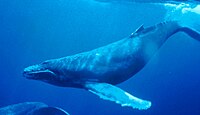
Photo from wikipedia
Marine mammals are more exposed to mercury (Hg) than any others animals in the world. As many trace elements, Hg it is able to impair the brain function, which could… Click to show full abstract
Marine mammals are more exposed to mercury (Hg) than any others animals in the world. As many trace elements, Hg it is able to impair the brain function, which could be a cause of population decline. Nevertheless, these issues have been scarcely studied because of the technical and ethical difficulties. We conducted a systematic review about marine mammals' brain exposition to Hg and other trace elements, and their neurotoxic effects. Information was scarce and the lack of standardization of nomenclature of brain structures, sample collecting and results presentation made it difficult to obtain conclusions. Hg was the most studied metal and toothed whales the most studied group. Despite being its target organ, brain accumulates lesser concentrations of Hg than other tissues as liver. We found a significant positive correlation between both organs' burden (rho = 0.956 for cetaceans; rho = 0.756 for pinnipeds). Reported Hg values in brain of cetaceans (median 3.00 ppm ww) surpassed by one or two orders of magnitude those values found in other species as pinnipeds (median 0.33 ppm ww) or polar bears (median 0.07 ppm ww). Such values exceeded neurotoxicity thresholds. Although marine mammals ingest mostly the organic and more toxic form MeHg, different fractions of inorganic mercury can appear in brain, which could suggest some detoxification mechanisms. Other suggested mechanisms include Se-Hg interaction and liver sequestration. Although other elements are subjected to a rigid homeostatic control, appear in low concentrations or do not exert an important neurotoxic effect, they should be more studied to elucidate their neurotoxicity potential.
Journal Title: Chemosphere
Year Published: 2019
Link to full text (if available)
Share on Social Media: Sign Up to like & get
recommendations!